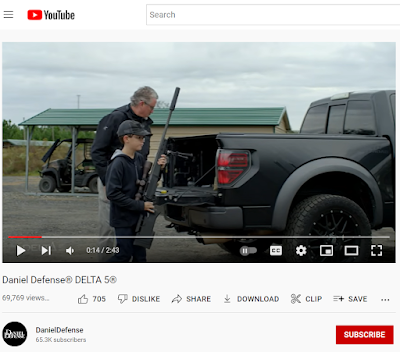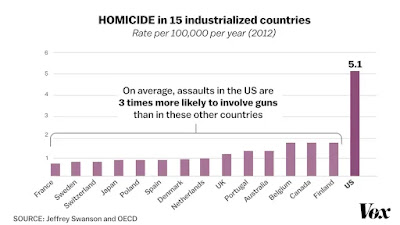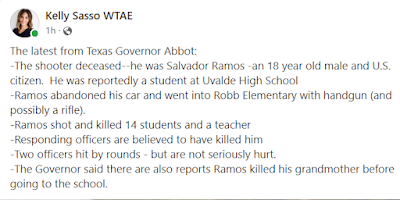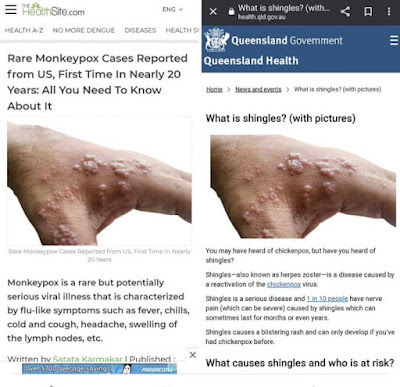John Stoehr believes that our current pro-gun insanity
began in 2008.
After the 2008 election, but especially after the 2012 election, the rightwing bloc of the Republican Party felt “betrayed” by democracy. After all, it created conditions by which voters elected a Black man.
In their eyes, the rule of law can’t include equal treatment, because “the rule of law” was never equal. It was racialized. In fact, “the rule of law,” for most of our country’s history, was “rule by white power.”
After Obama’s reelection, Republican governors and legislators began loosening previous firearms restrictions, allowing guns in churches, parks and other public spaces. The liberal reaction was befuddlement. After the bloodbath at Sandy Hook, what they were doing was insane!
Not to the rightwingers, though. After all, the sociopolitical orders of power that had once put them on top had been turned upside down. The oppressors had become the oppressed under this rule by a Black man. Expanding the range of guns was a way out of that predicament.
This would be plausible if the right's tendency to embrace the sociopathic stances of the gun lobby began in 2008. It didn't.
Two years after a gunman nearly assassinated him, President Ronald Reagan addressed
an NRA banquet, in a speech that was full of pro-gun talking points.
Reagan ... comforted the gun rights advocates by vowing to "never disarm any American who seeks to protect his or her family from fear and harm." He also stressed the importance of constitutional freedoms as "every American's birthright" and called for harsher punishments for career criminals. He touched upon other long-standing NRA themes, such as the view that gun control is the first step toward the total confiscation of all law-abiding citizens' guns, and that those who want to inflict harm on others aren't fazed by stricter gun laws—a nod to the assassination attempt in March 1981....
Reagan delivered his speech just a few years before the NRA embarked on a state-by-state campaign, beginning with Florida, to loosen concealed gun laws. Now, all 50 states and Washington, D.C., allow concealed carry in some form.
In 1986, five years after he was shot, Reagan signed the Firearm Owners Protection Act. While it banned the sale of new machine guns, it also
ticked off several items on an NRA wish list.
Among the reforms were the reopening of interstate sales of long guns on a limited basis, legalization of ammunition shipments through the U.S. Postal Service, removal of the requirement for record keeping on sales of non-armor-piercing ammunition, and federal protection of transportation of firearms through states where possession of those firearms would otherwise be illegal.
Remember, this was five years
after a president of the United States was nearly shot to death. And that president signed the bill.
The election of Bill Clinton and a Democratic Congress in 1992 briefly made gun control at the national level possible -- the
Brady bill gave us a national system of background checks in 1994, and a ten-year
ban on some assault weapons was also enacted that year -- but Clinton
blamed the NRA, with good reason, for Democrats' huge losses in the 1994 midterms.
Stoehr writes:
To restore the natural order – the rule of white power – they first needed to bring down the current one, to knock out its foundation.
As a result, in the decade since the Sandy Hook massacre, this country has witnessed one mass murder after another. Liberals and gun-control advocates blamed the GOP, naturally. They also blamed the NRA and “gun lobby.” But they were missing two crucial elements.
One, that to be for gun control is to be against white power....
Two, that every massacre, even those with no apparent motive, is a reaction to democracy’s challenge to the natural order of things.
Stoehr is half right. The gun community and the GOP want to leverage the fear of extreme violence. But while the violence is sometimes overtly racial -- as it was in Buffalo earlier this month -- sometimes it's just right-wing. After the 1995 bombing of a federal building in Oklahoma City, which killed 168 people,
including 19 children, there were efforts to prevent the future use of fertilizer in bombs. The NRA
wasn't having it, as
The New York Times noted at the time.
Technological advances in the last three decades might have made it harder to build such a bomb and easier to trace its origin, the experts say, but gun enthusiasts and makers of fertilizer and explosives have repeatedly blocked efforts to put the research to use.
"It is just amazing that in this dangerous time fanatical, boneheaded people are opposed to controls on explosives," said Representative Charles E. Schumer, Democrat of Brooklyn, who introduced bills in 1993 and 1994 that would have forced manufacturers to add an identifying marker to explosives so their users could be tracked.
Mr. Schumer was referring primarily to the National Rifle Association and the explosives industry, which helped defeat the bills....
The NRA/GOP blockade of taggant legislation
came up during the Boston Marathon bombing in
2015 2013:
One avenue of investigation is already closed off to forensic officials working the Boston Marathon bombing case due to efforts dating back decades by the National Rifle Association and gun manufacturers.
... a crucial piece of evidence called a taggant that could be used to trace the gunpowder used in the bombs to a buyer at a point of sale is not available to investigators.
... Explosives manufacturers are required to place tracing elements known as identification taggants only in plastic explosives but not in gunpowder, thanks to lobbying efforts by the NRA and large gun manufacturing groups.
... In the past, the NRA has argued that taggants could affect the trajectory of bullets and would also be a de facto form of weapons registration....
The gun lobby effectively sided with Muslim bombers who attacked a sporting event whoe fan base skews very white. And the gunners began raising these objections to taggants long before Obama's election.
Stoehr argues that even non-white mass shooters act on behalf of white supremacy:
There is a straight line between Obama’s election, Sandy Hook, the election of Donald Trump, the J6 insurrection and Tuesday’s bloodbath in Uvalde. Salvador Ramos wasn’t white, but he probably wanted to be. To be white is to be in power. To not be white is to be subject to power.
What better way is there for a nonwhite man to become white than by purchasing a gun and committing acts of political violence, against Hispanic children who will benefit from democracy and equal treatment under law, for the purpose of restoring the natural order?
So would Stoehr argue that
the Korean-born Seung-Hui Cho, who shot and killed
32 people, most of them white, at Virginia Tech a year and a half before Obama's election, was doing it on behalf of white supremacy? Seriously? How about the spree killers John Allen Muhammad and Lee Boyd Malvo, a Black man and a Black teenager who
killed 17 people in and around Washington, D.C., in 2002 -- did they do this on behalf of white supremacy? Are white people who shoot up mostly white institutions -- the schools in Columbine, Sandy Hook, and Parkland; the
church in Sutherland Springs, Texas -- doing it on behalf of the white race?
Yes, the NRA and the Republican Party are racist. Yes, they want perpetual rule by
their kind. But both of these things were true long before Barack Obama became president. They've been working to loosen weapons laws for nearly half a century. I'm certain that the election of Barack Obama was a prime motivator. But a Hillary Clinton victory in 2016 would have sent gun sales through the roof. Gun sales skyrocketed in response to a
virus.
They want control. They want to crush their enemies, or at least make their enemies live in fear. It can ultimately all be about race -- fear of marauding urban criminals, fear of immigrants, fear of "the China virus" -- but the republicans and the gunners also hate the white people they believe are making a culturally diverse America possible. And that was true long before 2008.














